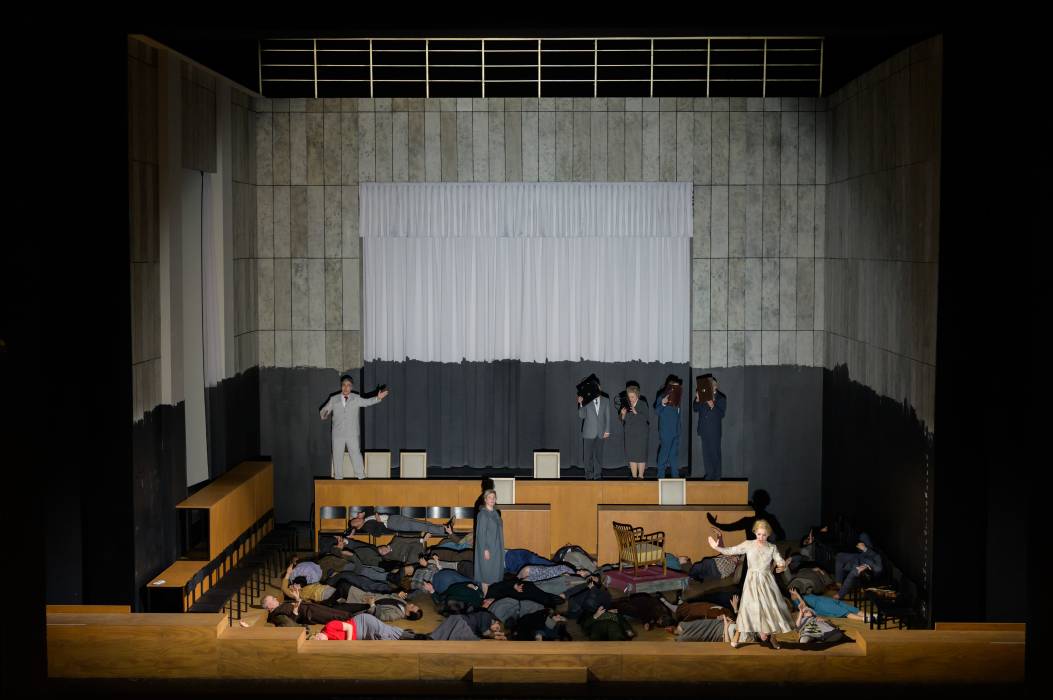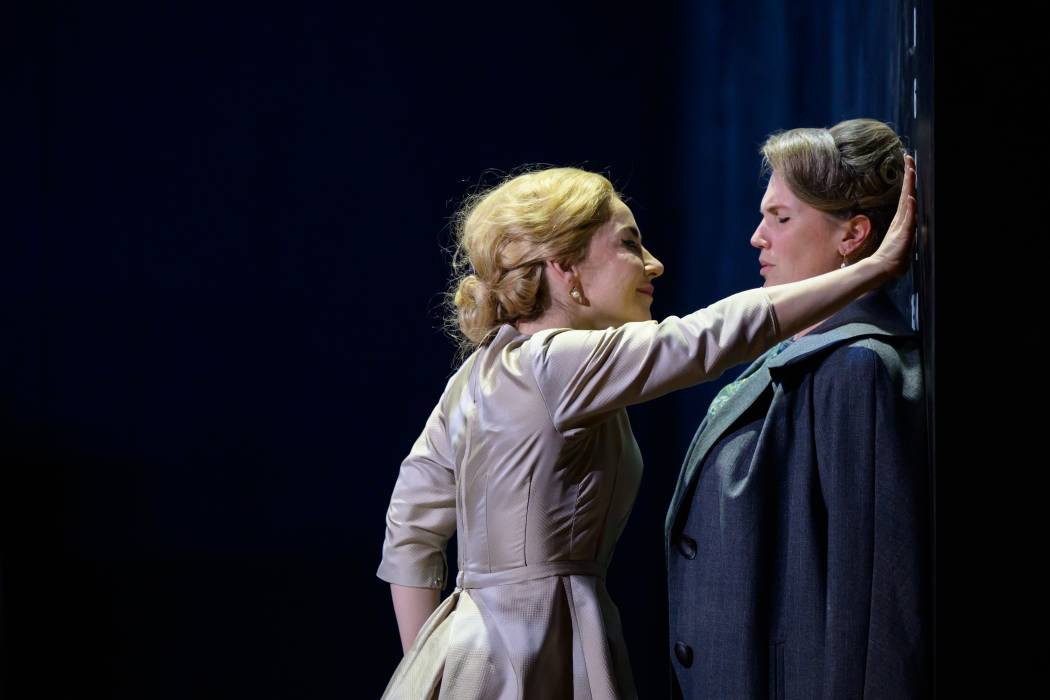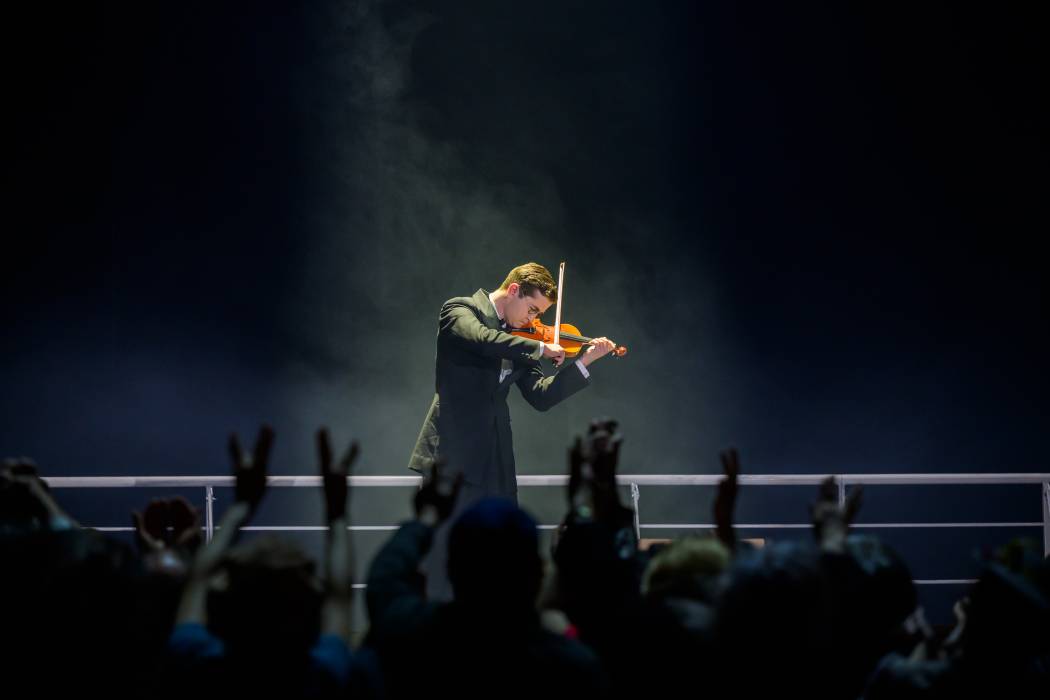A Tribunal of the Conscience: Jossi Wieler and Sergio Morabito stage Weinberg’s Die Passagierin in Weimar
Date of visit: April 5, 2025 (Premiere)
A difficult material
Tackling Mieczysław Weinberg’s Die Passagierin (1968) is no easy work. The opera engages with one of the darkest chapters of Europe’s history, confronting us with the horror of the actions, the trauma they cause, and – as in Jonathan Glazer’s 2023 masterpiece The Zone of Interest – with the inner life of the perpetrators.
Weinberg’s Die Passagierin, with the libretto by Alexander Medvedev based on the 1962 novel of the same title (original title: Pasażerka) by Auschwitz survivor Zofia Posmyz, combines both perspectives: that of the perpetrator, Anna Lisa Kretschmar (née Franz), a former concentration camp warden turned diplomatic wife, and that of the victim, Marta, here the only person holding the key to Lisa’s former life. On a cruise ship to Brazil accompanying her husband Walter to his new diplomatic post, Lisa notices a passenger reminding her of Marta, whom she believes was shot to death, and goes into a panic. After years of having repressed – and perhaps even forgotten! – the murderous deeds of the past, it dawns on her that her life has been built on shaky grounds after all.
Her first confession goes to Walter, who seems far more concerned about losing his job than about the nature of his wife’s past. In the final act of the opera, he even suggests that they put it all behind them – ironically just before the musicians of the dance hall, to Marta’s request, play the favorite waltz of the director of the concentration camp, which sends Lisa into a nervous breakdown…
Never forgotten, never forgiven
The waltz itself – “the waltz from hell”, as the libretto says – ties the climax of Marta’s tragic arc to the darkest truth of Lisa’s past. Having found out about Marta’s fiancé Tadeusz, a talented violinist, Lisa offers the lovers a rendezvous, most likely in hope to frame them and put them in the line of death penalty. Tadeusz declines the offer to not put Marta’s life at risk and be in the warden’s debt. Later, as Tadeusz finds himself on the death row, the camp director—gleeful in his perversion—organizes a concert with the violinist as the main attraction. “At least he’ll make himself useful before he dies,” the director tells his colleagues nonchalantly. On the day of the concert, he implores the violinist to play his favorite waltz “as if before God, whom he'll soon meet”. In a final act of rebellion, Tadeusz plays Bach’s Chaconne in D minor instead of the waltz. They destroy his violin, beat him up badly, and lead him away. Marta, who hesitated to attend the concert, witnesses it all… Having lost her friends and her fiancé, Marta swears to never forgive her tormentors.
Posmyz’s novel and Medvedev's libretto focus on Lisa’s perspective, thus giving a vantage point to her inner life. Unlike some real-life perpetrators—those convinced of their duty, those who glorified their actions, or those who had completely rewritten the episode (an example of such case is the story of Hilde M., who might have passed as the “nice grandma next door” if not for her backstory), Lisa is clearly tormented by her conscience, despite persistent attempts to recast herself as a decent warden, unlike the others. This is not true, of course, and even Lisa herself knows it.
In other words, she has lived with the sword of Damocles hanging over her. There must have been moments when she felt she could leave the past behind, shut it away behind some mental iron gate, and finally begin her new life. But the truth remains: the shadows of the past never quite release their grip. With Marta’s reappearance, escape becomes impossible.
A tribunal of the conscience
Jossi Wieler and Sergio Morabito’s approach to stage the opera as a (nightmarish) tribunal of the conscience is, in this regard, extremely intelligent.
Before delving into the staging, it is worth noting that Morabito, together with the author and librettist Susanne Felicitas Wolf, translated and adapted the original libretto—for the Weimar production—into German, Polish, Czech, Yiddish, French, and English. This enormous undertaking included selecting precise German words that matched the original language’s syllabic structure, allowing the singers to maintain their rhythms.
Wieler and Morabito’s staging brings the present and the past together, summoning the dead out of the dust of forgetfulness and distant memories and giving them the opportunity to confront Lisa herself. Although none of the typical iconography of the Holocaust was used, the message is no less clear, thanks to Anna Viebrock’s décor: a metaphorical tribunal that is a replica of the hall of the Auschwitz Trial of Frankfurt in 1963, and a chair in the middle, with a chair placed center stage, evoking Ilse Koch’s position during the Buchenwald main trial in Dachau. The costumes, also by Viebrock, rooted in the aesthetics of the 1950s and 1960s, offer both a temporal anchor and a symbolic split in Lisa’s persona: that of the present day as an elegant diplomatic wife in an old Dior-type dress and that of the murderous warden through an identical reference to the “Hyena of Auschwitz” Irma Grese.
It helps, too, that Weimar boasts a remarkable ensemble—both musically and dramatically skilled—with a strong grasp of their characters’ psychology and behavior. Soprano Emma Moore is both chilling and charismatic as Marta, her transparent, crystalline voice standing in sharp contrast to the darker, velvety mezzo of her former tormentor (Sarah Mehnert, an imposing and corrosive Lisa, striking in both her pretension and unravelling). Taejun Sun, as Lisa’s husband Walter, brings a warm and luminous tenor capable of lyrical tenderness and erratic emotional outbursts—the respected diplomat is clearly no more morally grounded than his wife, and certainly no more trustworthy. Baritone Ilya Silchuk lends Tadeusz a dignified presence, both in bearing and in tone. His duet with Moore’s Marta, rich in warmth and brilliance, becomes one of the few faint glimmers of hope amid the opera’s pervasive dread and despair. Another, this time a cappella, comes in “the song of the homeland” sung by the Russian dissident Katja, portrayed by Heike Porstein with razor-sharp precision and radiant presence. Among Marta’s fallen friends, mezzo-soprano Tatjana Winn as Bronka balances lyrical luminosity with rougher, darker textures, in a thoughtful, dramatically attuned performance. One can only imagine how psychologically taxing it must be to embody these roles. I have nothing but admiration for the artists. They are supported powerfully by the Opernchor (choir director: Jens Petereit), convincing both vocally and choreographically.
The Staatskapelle Weimar, under the baton of Roland Kluttig, draws out the music’s many layers with finesse and deep insight. The score breathes with drama and the right kind of tension, never allowing us to forget that foreboding and despair simmer beneath even the faintest warmth or hope (as in Marta and Tadeusz’s duet, or Bronka’s final prayer). Given that Die Passagierin incorporates techniques from film music—jazz fragments during the shipboard dance scenes, and a direct quotation of Bach’s Chaconne—Tadeusz’ final performance is undeniably the opera’s dramatic pinnacle. In that moment, everything falls still, as if the music itself holds its breath—until the first bars of the Chaconne break the silence. Gradually, the orchestra builds around it, increasingly distorted, queasy, and restless, casting a dark mist over Bach’s work, as if it already knows what is to come. With Tadeusz’ death, the dramatic arc collapses into its dénouement, bringing down Lisa’s elaborate defense mechanisms and her psychological fortress in one final crash. The Staatskapelle never shies away from this brutal catharsis—the brass section menacing and immense, crashing into the dense, shadowed depths of the strings.
And in the end, all that remains are the voices of those long forgotten by the perpetrators, but kept alive by Marta alone. Having fulfilled her promise to Tadeusz and to her fallen friends, she names them—summoning them out of the dust of death and oblivion.
Die Passagierin at the Deutsches Nationaltheater und Staatskapelle Weimar runs until June 9th, 2025.





Comments
Post a Comment